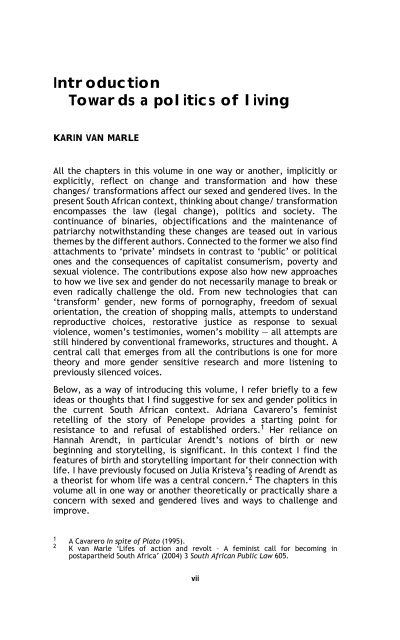Sex, Gender, Becoming - PULP
Sex, Gender, Becoming - PULP
Sex, Gender, Becoming - PULP
Create successful ePaper yourself
Turn your PDF publications into a flip-book with our unique Google optimized e-Paper software.
Introduction<br />
Towards a politics of living<br />
KARIN VAN MARLE<br />
All the chapters in this volume in one way or another, implicitly or<br />
explicitly, reflect on change and transformation and how these<br />
changes/ transformations affect our sexed and gendered lives. In the<br />
present South African context, thinking about change/ transformation<br />
encompasses the law (legal change), politics and society. The<br />
continuance of binaries, objectifications and the maintenance of<br />
patriarchy notwithstanding these changes are teased out in various<br />
themes by the different authors. Connected to the former we also find<br />
attachments to ‘private’ mindsets in contrast to ‘public’ or political<br />
ones and the consequences of capitalist consumerism, poverty and<br />
sexual violence. The contributions expose also how new approaches<br />
to how we live sex and gender do not necessarily manage to break or<br />
even radically challenge the old. From new technologies that can<br />
‘transform’ gender, new forms of pornography, freedom of sexual<br />
orientation, the creation of shopping malls, attempts to understand<br />
reproductive choices, restorative justice as response to sexual<br />
violence, women’s testimonies, women’s mobility — all attempts are<br />
still hindered by conventional frameworks, structures and thought. A<br />
central call that emerges from all the contributions is one for more<br />
theory and more gender sensitive research and more listening to<br />
previously silenced voices.<br />
Below, as a way of introducing this volume, I refer briefly to a few<br />
ideas or thoughts that I find suggestive for sex and gender politics in<br />
the current South African context. Adriana Cavarero’s feminist<br />
retelling of the story of Penelope provides a starting point for<br />
resistance to and refusal of established orders. 1 Her reliance on<br />
Hannah Arendt, in particular Arendt’s notions of birth or new<br />
beginning and storytelling, is significant. In this context I find the<br />
features of birth and storytelling important for their connection with<br />
life. I have previously focused on Julia Kristeva’s reading of Arendt as<br />
a theorist for whom life was a central concern. 2 The chapters in this<br />
volume all in one way or another theoretically or practically share a<br />
concern with sexed and gendered lives and ways to challenge and<br />
improve.<br />
1 A Cavarero In spite of Plato (1995).<br />
2<br />
K van Marle ‘Lifes of action and revolt – A feminist call for becoming in<br />
postapartheid South Africa’ (2004) 3 South African Public Law 605.<br />
vii
















